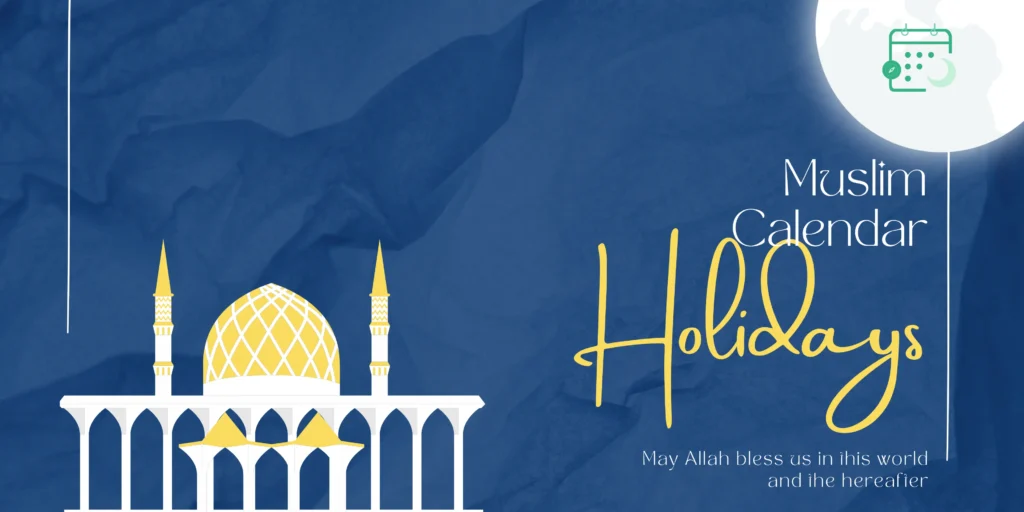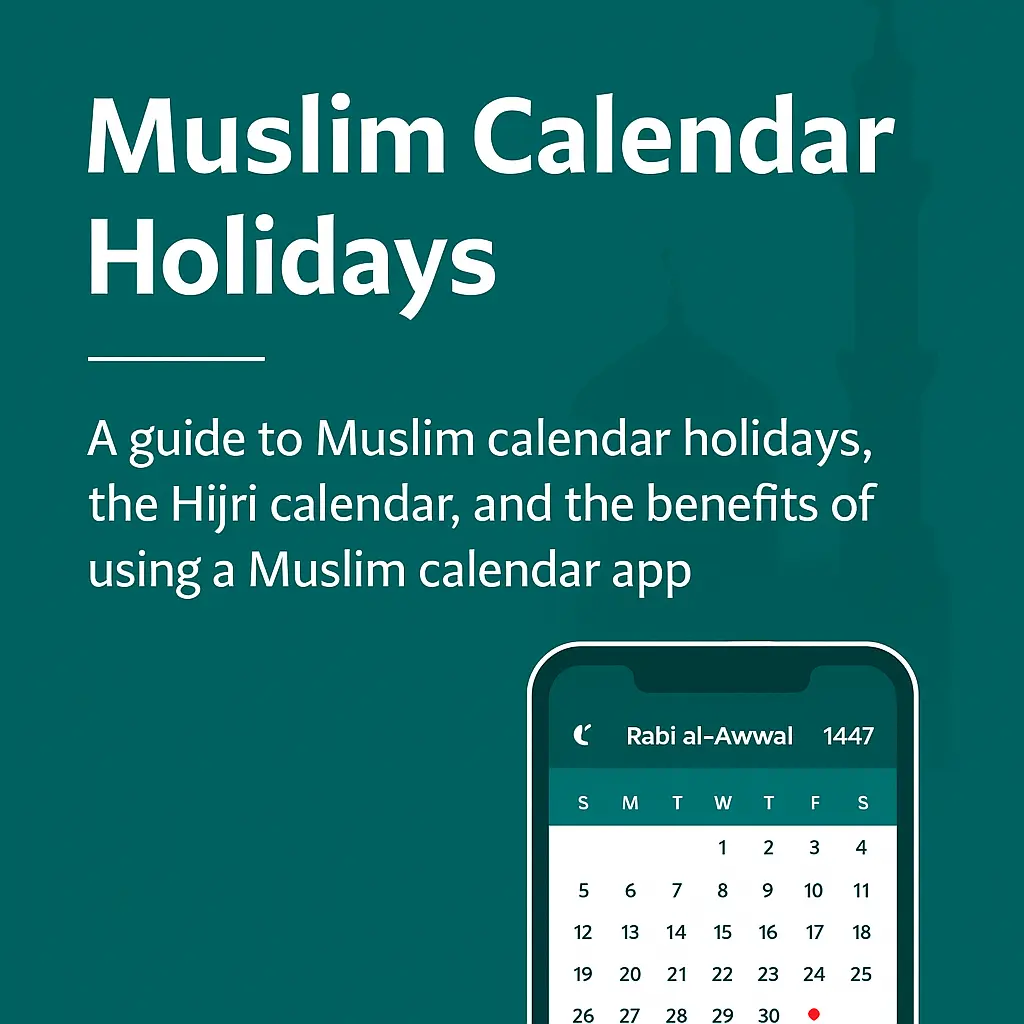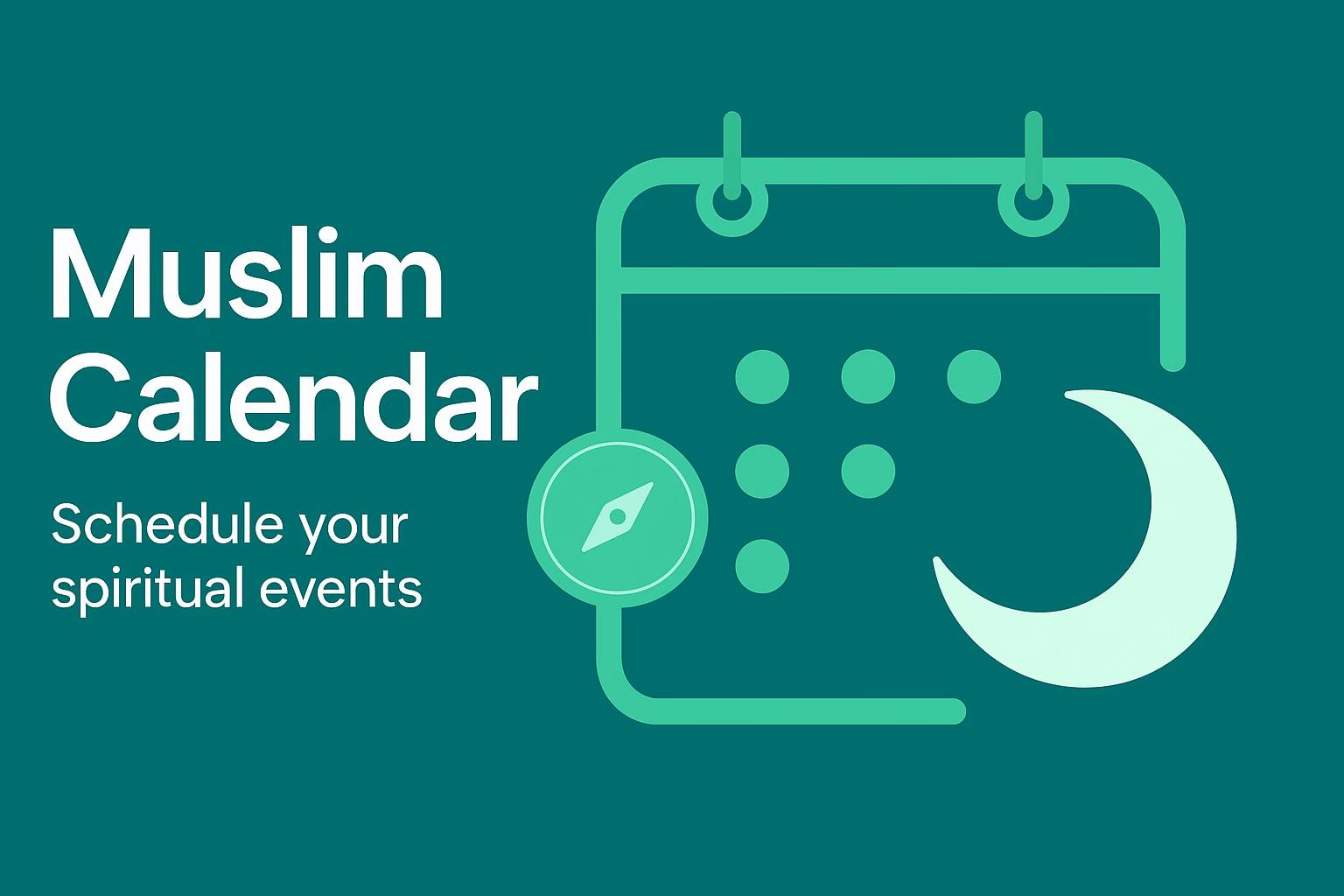
The muslim calendar holidays mark some of the most spiritually enriching moments in a believer’s life, connecting millions of Muslims worldwide through shared traditions and sacred observances. Unlike the Gregorian calendar that governs our daily schedules, the muslim calendar follows lunar cycles, creating a unique rhythm that brings communities together in worship, reflection, and celebration.
This comprehensive guide will take you through the significant holidays of the Hijri calendar, exploring their deep spiritual meanings, traditional celebrations, and how modern muslim calendar app technology helps families stay connected to these sacred dates. Whether you’re seeking to deepen your understanding of Islamic traditions or planning your family’s religious observances, this journey through the Islamic year will illuminate the beauty and wisdom embedded in each sacred occasion.
Understanding the Foundation: The Muslim Calendar System
What Makes the Muslim Calendar Special?
The muslim calendar, also known as the Hijri calendar, operates on a 354-day lunar year, making it distinctly different from solar calendars. This system creates a beautiful phenomenon where Islamic holidays rotate through different seasons over the years, ensuring that every Muslim experiences Ramadan in summer, winter, spring, and autumn throughout their lifetime.
The calendar begins with Muharram and consists of 12 months, each marking significant events in Islamic history. This lunar system reflects the natural rhythm that Allah created in the heavens, as mentioned in the Quran: “It is He who made the sun a shining light and the moon a derived light and determined for it phases – that you may know the number of years and account [of time]” (10:5).
The Role of Technology in Preserving Traditions
Modern muslim calendar app solutions have revolutionized how families track these sacred dates. In my experience working with Muslim communities across different continents, I’ve witnessed how these digital tools bridge generational gaps, helping younger Muslims stay connected to their heritage while assisting busy parents in planning religious observances.
A reliable muslim calendar app eliminates the confusion that once surrounded date calculations, providing accurate prayer times, Qibla direction, and holiday notifications that keep families synchronized with the global Muslim community.
Major Muslim Calendar Holidays: A Month-by-Month Journey
Muharram: The Sacred Beginning
Ashura (10th of Muharram) stands as one of the most significant days in the Islamic calendar. This day commemorates multiple historic events, including the salvation of Prophet Musa (Moses) and his people from Pharaoh, and the martyrdom of Hussein, the grandson of Prophet Muhammad (peace be upon him).
The observance of Ashura differs across Muslim communities:
- Sunni Muslims often fast on this day, following the Prophet’s tradition
- Many engage in increased dhikr (remembrance of Allah) and charitable activities
- Shia communities hold mourning ceremonies honoring Hussein’s sacrifice

Rabi’ al-Awwal: Celebrating the Light of Guidance
Mawlid al-Nabi (12th of Rabi’ al-Awwal) celebrates the birth of Prophet Muhammad (peace be upon him). While practices vary globally, the essence remains universal – reflecting on the Prophet’s teachings and embodying his character.
Traditional celebrations include:
- Recitation of na’at (poetry praising the Prophet)
- Community gatherings featuring Islamic lectures
- Charitable distributions to honor the Prophet’s generosity
- Special meals shared with neighbors regardless of faith
Rajab: The Month of Spiritual Preparation
Isra and Mi’raj (27th of Rajab) commemorates the Prophet’s miraculous night journey from Mecca to Jerusalem and his ascension to the heavens. This sacred holiday emphasizes spiritual elevation and the importance of prayer in a Muslim’s life.
Many families use this time to:
- Increase their night prayers (tahajjud)
- Study the significance of the five daily prayers
- Reflect on their spiritual journey and connection with Allah
The Crown Jewel: Ramadan and Its Sacred Holidays
Laylat al-Qadr: The Night of Power
Laylat al-Qadr, occurring during the last ten nights of Ramadan, is described in the Quran as “better than a thousand months.” This night transforms ordinary worship into extraordinary spiritual opportunity.
The unique aspects of this celebration include:
- Extended night prayers in mosques worldwide
- Increased Quran recitation and contemplation
- Intensified charitable giving and community service
- Family gatherings focused on worship and supplication
Eid al-Fitr: The Festival of Joy
The conclusion of Ramadan brings Eid al-Fitr, a celebration that perfectly balances spiritual gratitude with communal joy. Unlike secular holidays focused on material aspects, Eid emphasizes spiritual achievement and community solidarity.
The distinctive Islamic approach to celebration includes:
- Beginning with special Eid prayers at dawn
- Mandatory charity (Zakat al-Fitr) before prayers
- Visiting elderly relatives and community members
- Sharing meals with less fortunate neighbors
- Exchanging gifts that often carry educational or spiritual value
Dhul Hijjah: The Pinnacle of Islamic Observance
Eid al-Adha: The Festival of Sacrifice (The Last Of Muslim Calendar Holidays)
Eid al-Adha represents the culmination of Hajj pilgrimage and commemorates Prophet Ibrahim’s willingness to sacrifice for Allah. This four-day celebration showcases Islam’s emphasis on sacrifice, charity, and global unity.
The unique elements of this Islamic festival include:
- Synchronized celebration with Hajj pilgrims in Mecca
- Qurbani (ritual sacrifice) distributed among family, friends, and the poor
- Special prayers acknowledging Allah’s blessings
- Emphasis on helping those in need through meat distribution
The Ten Days of Dhul Hijjah
These sacred days, particularly for those not performing Hajj, offer intense spiritual opportunities through increased worship, fasting, and charitable activities.
How Muslim Calendar Holidays Differ from Other Religious Celebrations
Spiritual Focus Over Material Display
Islamic holidays prioritize spiritual growth and community welfare over commercial aspects. Where other religious celebrations might center on gift exchanges or elaborate decorations, muslim calendar holidays emphasize:
- Worship and remembrance of Allah
- Strengthening family and community bonds
- Charitable giving and social responsibility
- Reflection and spiritual self-improvement
Community-Centric Celebrations
The Islamic approach to holidays creates inclusive celebrations that strengthen social fabric. Neighbors of all faiths often receive gifts of food during Eid, mosques open their doors for community meals, and charitable distributions ensure everyone can participate in the joy.
Lunar Rhythm and Global Unity
The lunar calendar creates a unique global synchronization where Muslims worldwide celebrate together, regardless of geographical location. This universal timing strengthens the concept of ummah (global Muslim community) and creates shared experiences across cultures.
Practical Tips for Observing Muslim Calendar Holidays
Using Technology to Stay Connected
A comprehensive muslim calendar app serves as your digital companion throughout the Islamic year by:
- Providing accurate holiday dates based on moon sighting
- Sending customizable reminders for important observances
- Offering educational content about each holiday’s significance
- Connecting you with local mosque events and community celebrations
Creating Meaningful Family Traditions
Successful holiday observance requires intentional planning and family involvement:
- Involve children in learning about each holiday’s historical significance
- Establish special family prayers or Quran reading sessions
- Plan charitable activities that teach compassion and social responsibility
- Create photo journals documenting your family’s Islamic holiday traditions
Balancing Work and Worship
Modern Muslim families often struggle to balance professional obligations with religious observances. Effective strategies include:
- Using your muslim calendar app to plan ahead for major holidays
- Communicating with employers about important Islamic dates
- Creating flexible celebration schedules that accommodate work commitments
- Focusing on quality rather than quantity in religious observances
The Global Impact of Muslim Calendar Apps
Bridging Geographical Distances
Muslim calendar apps have transformed how diaspora communities maintain connections to their Islamic identity. Families separated by continents can now coordinate their celebrations, ensuring that children growing up in non-Muslim countries remain connected to their heritage.
Educational Resource for New Muslims
These digital tools serve as invaluable resources for new Muslims learning to navigate the Islamic calendar. The apps provide detailed explanations, suggested practices, and community connections that ease the transition into Islamic religious life.
Supporting Interfaith Understanding
When non-Muslim colleagues and neighbors have access to accurate information about Islamic holidays through these apps, it promotes workplace accommodation and community harmony.
Looking Forward: The Future of Islamic Holiday Observance
The integration of technology with traditional Islamic practices represents an evolution, not a replacement, of centuries-old traditions. As muslim calendar app technology continues advancing, we can expect:
- Enhanced community features connecting Muslims globally
- Personalized spiritual guidance based on individual practice levels
- Integration with smart home devices for prayer reminders and Quranic recitation
- Augmented reality features for Qibla direction and Islamic educational content
Conclusion: Embracing the Sacred Journey
The muslim calendar holidays offer a structured path for spiritual growth, community building, and divine connection throughout the year. Each celebration carries profound lessons about faith, sacrifice, gratitude, and social responsibility that remain relevant across all aspects of life.
By understanding and observing these sacred occasions, Muslim families create meaningful traditions that pass Islamic values to future generations while strengthening their connection with the global ummah.
The beauty of the Islamic calendar lies not just in its individual holidays, but in the complete journey it creates – a year-long cycle of spiritual preparation, intense worship, joyful celebration, and contemplative reflection.
Ready to Begin Your Sacred Journey?
Transform your family’s connection to Islamic traditions with a comprehensive muslim calendar app. Download our featured muslim calendar app today, available on both Android and iOS platforms, and never miss another sacred occasion.
🌙 Features you’ll love:
- Accurate Hijri dates and holiday notifications
- Prayer times for your exact location
- Educational content about each Islamic holiday
- Community event listings and mosque finder
- Customizable reminders for religious observances
📱 Download now and share with your family and friends to strengthen your Islamic community connections.
💬 We’d love to hear from you! Share your family’s Islamic holiday traditions in the comments below and inspire others in their sacred journey through the Hijri year.
Frequently Asked Questions (FAQs)
Q: How accurate are muslim calendar apps for determining Islamic holidays? A: Modern muslim calendar apps use sophisticated algorithms based on astronomical calculations and traditional moon sighting methods. Most reliable apps offer both calculated dates and local moon sighting confirmations, providing accuracy rates above 95% for major Islamic holidays.
Q: Why do muslim calendar holidays fall on different dates each year in the Gregorian calendar? A: The muslim calendar follows lunar cycles of approximately 354 days, which is 11 days shorter than the solar-based Gregorian calendar. This causes Islamic holidays to shift earlier by about 11 days each year in the Gregorian calendar, creating a 33-year cycle where holidays rotate through all seasons.
Q: Can I celebrate muslim calendar holidays if I live in a non-Muslim country? A: Absolutely! Muslim calendar holidays are designed to be observed anywhere in the world. A good muslim calendar app will help you find local mosque communities, halal food suppliers for holiday meals, and connect with other Muslim families in your area for shared celebrations.
Q: What’s the difference between how Sunni and Shia Muslims observe Islamic holidays? A: While the core spiritual significance remains the same, some observances may vary. For example, Ashura is observed as a day of fasting by many Sunni Muslims, while Shia communities often hold mourning ceremonies. Most muslim calendar apps include information about different traditional observance methods.
Q: How can I teach my children about muslim calendar holidays? A: Use age-appropriate educational content from your muslim calendar app, involve children in holiday preparations, share stories about the historical significance of each holiday, and create family traditions that make the observances memorable and meaningful.
Q: Do I need to fast or perform special prayers for all muslim calendar holidays? A: Each Islamic holiday has its own recommended practices. Some involve fasting (like Ashura), others focus on extra prayers (like Laylat al-Qadr), and some emphasize charity and community celebration (like both Eids). Your muslim calendar app should provide specific guidance for each observance.
Q: How do muslim calendar apps help with planning Islamic holiday celebrations? A: These apps provide advance notice of upcoming holidays, suggest traditional activities and prayers, offer recipe ideas for holiday meals, help locate community events, and send reminders for important observances, making it easier to plan meaningful celebrations with family and community.

